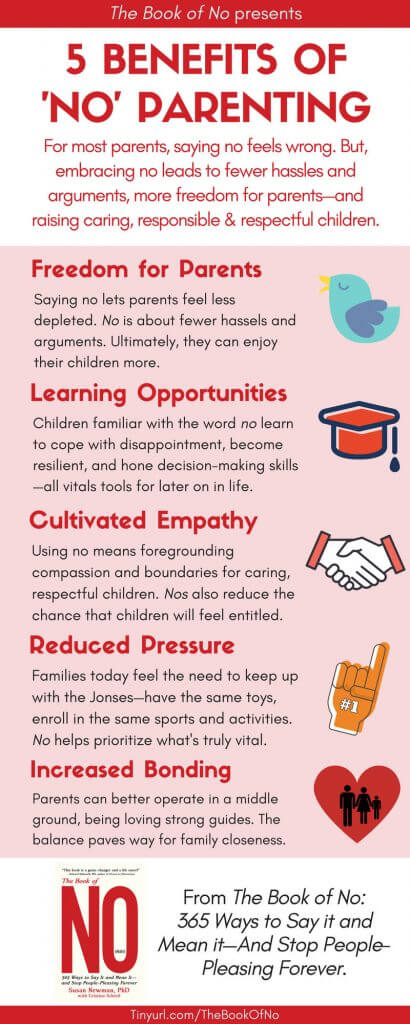
If you’re a people-pleaser and a parent, beware. Research shows that your behavior can have a negative impact on your child’s development.
We all want what’s best for our children. Whether they’re toddlers or teenagers, a parent’s natural tendency is to want their children to be content and happy. To meet that goal, natural people-pleasers slip easily into a pattern of granting wishes and requests whenever they can. Even if being pleasing people wasn’t one of your lifelong characteristics, children have a way of bringing out the people-pleaser in all of us.
In the extreme, saying yes to seemingly endless wants— “Drive me here…” “Buy me this…” “Let me sign up…”—morphs into a damaging cycle that I call “yes-parenting.” For well-meaning “yes-parents,” the word no is a response steeped in negativity, the very thing they try to avoid.
Some parents might argue that being a people-pleaser to their children makes them happy. That’s valid to an extent. The reality is that children also benefit when parents say no. How? When kids don’t get what they want, they learn resourcefulness, discovering ways to achieve their own desires and goals. They also learn resilience, initiative, and grit—abilities that help children overcome challenges throughout life.
Many parents can’t or don’t utter the word no often enough.
Why You Might Be a People-Pleaser and Yes-Parent
When conducting research for The Book of No: 365 Ways to Say it and Mean it—and Stop People-Pleasing Forever, I discovered myriad motives at the heart of yes-parent behavior. For example, you may give in or give permission, even if it makes your life more difficult or stressful, to alleviate guilt for not spending as much time as you’d like with your children. You might say yes to buying unneeded toys or a shirt that your child’s best friend has so your child doesn’t feel deprived. Or, you might drive your teenager and his friends to whatever activity they fancy on weekends to be popular with your kids.
You might have been raised by equally indulgent parents and equate a giving demeanor with good parenting. On the flip side, you might be striving, consciously or subconsciously, to offset the childhood you had—one in which your requests or wishes were routinely ignored or refused.
Perhaps you bend to societal pressure to raise “star children”—recognition you may have wanted for yourself growing up. You allow your kids to take on an extreme number of extracurricular activities, participate in several sports, or enroll in too many high demand academic courses. When the desire to be recognized or stand out is driven by a parent, a “yes, go ahead” will be on the tip of that parent’s tongue.
More typically, parents become people-pleasers to keep peace. It’s much simpler to go against your own rules and grant an extra hour of weeknight television to avoid a tantrum. For stressed, exhausted parents, saying yes makes sense in the short run when compared to dealing with a child’s frustration with or anger at your denial.
The Positive Power of Shedding the People-Pleaser Role
Despite its negative connotations, the word no is a positive for helping children become responsible, resourceful, and engaged adults. When parents say no, it opens new learning opportunities. Of course, you don’t want to break children’s spirits with endless noes, but you want your children to understand and learn to respect rules and boundaries and not come to see you as a parent who always aims to please.
Firm, direct, and strategic nos curb a child’s sense of entitlement. Your refusals help children digest disappointment. If they aren’t used to hearing no from you, the sting of hearing it from teachers, coaches, professors, or bosses will be magnified. Setting limits gives children behavioral guidelines that will be useful in many areas of their lives.
Strategic nos sharpen a child’s decision-making skills. Children who confront denial become more resilient and adept at figuring out acceptable solutions on their own.
You will get pushback; children don’t much care what’s best for them when they are focused on what they want at a given moment. Making difficult choices that build character and caring is a parent’s job. You are their leader, guide, mentor, and best role model—not a lasting people-pleaser.
6 Ways to Get Comfortable Saying NO
Here are actionable ways to use the power of no as a positive force in your children’s lives. You will become more able to call up a no when you need it with your toddlers, elementary-aged children, pre-teens, or teenagers.
1. Notice when your yes-reflex becomes automatic.
In those moments when you know you should be saying no—but lean toward being a people-pleaser—take time to step back and analyze the situation. Stop to ask yourself: Will a no be more likely to teach my child the importance of sticking to his commitments? Will it teach her resourcefulness?
2. Don’t feel the need to justify a no.
Parents don’t always have to justify their nos. It’s your prerogative—your parental right. As parent, you’re allowed to change your mind or go back on a previously established rule or promise. For instance, if you’ve said yes to a television in the bedroom when your daughter turns 13, but recently learned the pitfalls and change your mind, stick to your reversal.
3. Stand firm to reinforce and negotiate boundaries.
Set clear boundaries with your children and insist they respect them. Be consistent as you implement house rules. With older children and teens, you may need to negotiate or compromise to reset limits or insure they honor their agreements or promises.
4. Require chores to emphasize and teach responsibility.
Most children will try to evade or refuse tasks you assign. Really, what kid likes to rake leaves, vacuum, or do dishes? Several studies, including The Harvard Grant Study, that tracked graduates from 1938 onward, show a positive correlation between chores and success in adulthood.
As loudly and as often as your children may complain about chores, those tasks help instill a work ethic. Teaching children household basics also helps them feel competent and that they are contributing to the family.
5. Be caring and compassionate.
Realize that saying no need not be unreasonably stern. It is often best to lower your voice for children to hear you. Whenever possible, skip the lectures, but let your child know that you understand her disappointment.
When there’s a practical reason to refuse, share it with your children while standing your ground. If a child begs for an example, give a strong no with evidence: “Someone in the family is allergic… Everyone is gone during the day…”
6. Encourage self-awareness.
Shedding your role of people-pleaser not only contributes to your own self-awareness, but to that of your child too. Let’s say your child wants to add a second sport to an already packed schedule. Rather than an immediate no, nurture your child’s self-awareness by questioning if his excitement in the short-term will morph into exhaustion or unnecessary stress later. Ask your child to tell you how he thinks this decision will affect his schoolwork or time to do the other things he loves.
Scaling back the people-pleaser aspect of parenting helps you provide continued, steadfast guidance to your child. Your nos play a large role in how your children will act once they are out in the world and no longer dependent on you to meet their needs. They will not remember most of the things you denied them. Instead, your children will be grateful for the strength of character you have built inside of them.
Infographic to Share
This infographic was created from material in The Book of No: 365 Ways to Say it and Mean It—And Stop People-Pleasing Forever. You are welcome to save it or copy and share it on your social media.
Published: October 29, 2017




